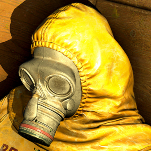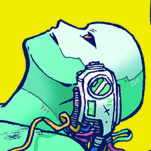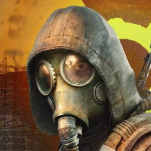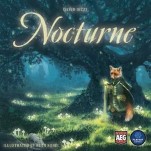Transistor (PS4 / PC)
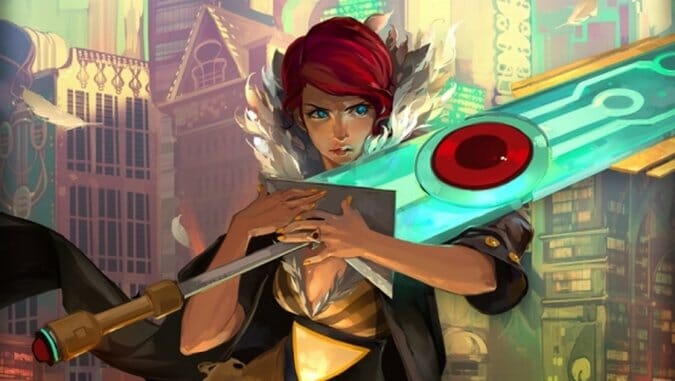
Like Supergiant’s previous game Bastion, Transistor starts at the beginning of the end, the player left to play through the wreckage of a fallen world. The protagonist, Red, is a silent one, not in the standard videogame-trope sort of way, but because of a concrete development: An apparently evil super-group stole her voice.
Thankfully, Red’s partner, a mysterious man trapped in a giant futuristic sword-like weapon, is there to speak for her. And anyway, Red seems less interested in talking than she is in acting and affecting change. She rarely acknowledges the Transistor’s words, even when they very clearly affect her. Most crucially, at the moment when Red has an opportunity to save herself, she instead throws herself headfirst into the fight. That’s when the game really begins.
Compared to Bastion’s whimsical and patient meandering, Transistor conveys a sense of urgency in its approach. Real-time gameplay is fast-paced, and the game’s mechanical calling-card, a movement and attack planning mode referred to as “Turn(),” goes a long way toward keeping the player in step with Red’s desperate compulsion to achieve progress and justice and right the wrongs that have been done to her and those around her.
Videogames have explored the concept of power since their inception, but few games have handled the subject with as much nuance. Transistor doesn’t take a clear stance on the nature of power: Whether it ought to be sought or rejected, whether it inevitably corrupts or ought to be handed over to the oppressed is left up for debate. When it comes to philosophical and moral resolution, the player is left hanging in a significant way. But the game does explore those issues within every crevice of the game, refusing to flinch at the potential dangers of unchecked authority over others.
When Red’s voice is taken from her, she is left with no other option but to lash out with a flurry of action. The Transistor’s dual offering of speech and power doesn’t reign her in so much as it enables her.
Even though we never hear Red speak, we grow to know her over time, not least of all because we inhabit her mindset through various decisions. There are homages to the occasional choices that we’re used to seeing in videogames: What kind of pizza should Red order? What kind of weather would Red like? But in Transistor, those pre-planned choices are more trivial and ineffectual than the strategic choices made within the Transistor’s internal interface that affect the possibilities and posture that Red takes in combat.
Transistor’s wide variety of functions that can be used as weapons, weapon upgrades and passive attributes gives combat preparation a surprising philosophical weight that goes beyond simply considering the nature of violence. Is it better to be empathetic or assertive? Is it more effective to be subversive or chaotic?
Each mechanical function is a spiritual outgrowth of a fellow human being who was killed by the Camerata, an apparently blatant attempt to silence influencers. Red was silenced all right, but she wasn’t quite killed. She gains insight, inspiration and efficacy through her fallen forebears. For the player, each of these personality traits changes the way the game is played. Instead of merely choosing four functions (or traits) to use as weapons, Transistor’s nuance is on full display in the ability to alter each function with another function. Sure, empathy on its own can be too soft, too passive. But temper it with a bit of subversiveness, and you’ve got a little more balance and potency.
The ability to choose between functions as a way of improving oneself serves as both an incredibly deep play mechanic and a reminder of the problem with the kind of power that the Transistor represents. Through this series of choices, the player grapples with the reality that they are using human beings to achieve their own purposes.
Early on in the game, when Red and the Transistor find a deceased friend in the street, the mysterious man in the Transistor remarks hopefully, “We can use her.” Then she is stored in the Transistor like Red’s mysterious friend and a host of other deceased people. They are useful, even in death, for the cause. And each of them seems to be willing to go along for the ride.
-

-

-

-

-

-

-

-

-

-

-

-

-

-

-

-

-

-

-

-

-

-

-

-

-

-

-

-

-

-

-

-

-

-

-

-

-

-

-

-
























